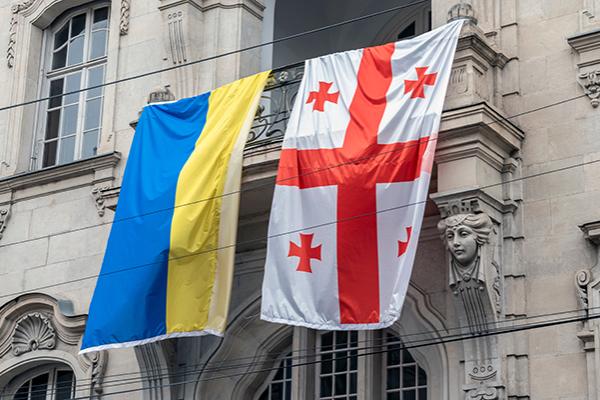How Georgia’s Foreign Policy Has Been Affected by The War in Ukraine

Written by Gillian Ginley, CSEEES Spring 2023 intern
The war in Ukraine has altered politics and global security for many countries across Europe, especially countries that border Russia. Specifically, Georgia has taken an interesting approach to addressing the current situation of the war. While the president, prime minister, and head of parliament of Georgia claimed solidarity with Ukraine, the Georgian government did not accompany the rest of the world in the implementation of international sanctions against Russia. At the beginning of the war, a group of Georgian volunteers was heading to Ukraine to fight in the war against Russia, but the Georgian police forces grounded the plane, preventing these volunteers from leaving. Many analysts believe that the Georgian government’s response to the war is a defense mechanism wielded in the hopes that Georgia can avoid being drawn into an armed conflict with Russia. It should be noted that this benevolent neutrality is being heavily scrutinized by Western countries, provoking accusations of Georgia’s affiliation with Russia, yet there is no clear evidence or data to support these claims.
Navigating the proper balance between supporting Ukraine without provoking territorial and economical disputes with Russia has proven to be a difficult task for Georgia. The current main threats to Georgia’s foreign security come mainly from its close proximity to Russia. Sharing a border with Russia puts Georgia in a vulnerable state for potential invasion and annexation of Georgian territory. This concern is not unwarranted; in 2008, Russia launched a full-scale invasion of Georgia under the accusation that Georgia was committing genocide against the native people of Abkhazia and South Ossetia, resulting in the annexation of both territories by Russian forces. The underlying instability of Russia’s occupation in the North Caucasus region, as well as Russia’s source of hybrid warfare against Georgia, intensifies their fear of their superpower neighbor. The minimal effort to reconstruct relations with Europe is considered a serious risk to Georgia and other countries of the South Caucasus because it leaves room for Russia to progress with its violent agenda.
Georgia has an important geographical role as a transcontinental country between Eastern Europe and Western Asia, as well as its location on the Black Sea. Prior to Russia’s invasion of Ukraine, the Black Sea region presented little interest to members of NATO and the EU, but now the region is considered a crucial strategic space for Euro-Atlantic security to develop. Being a littoral state on the Black Sea, Georgia has a significant opportunity to become an alternative transit route that links Europe to the South Caucasus region and beyond. With this route, Georgia would be the key to upholding the energy supply that Europe receives from Azerbaijan, and additionally connecting the European and Central Asian markets.
The majority of the Georgian population would love to see their country lean more into its European identity, but gaining EU membership has been difficult. On May 17, 2021, Georgia, Ukraine, and Moldova established the Association Trio in order to enhance their cooperation while they work toward EU membership. Georgia had originally planned to apply in 2024, but due to the invasion, this timeline moved up and they applied for EU membership in March 2022. Following a recommendation from the EU Commission, Georgia was denied candidate status, and the EU council cited 12 areas in which the Georgian government needed to make improvements for potential candidacy to be reexamined in the future. Foreign policy analysts claim that there is a minimal chance that Georgia will be able to gain EU status, as continuing the implementation of the reforms will increase the risk that Georgian Dream, the current ruling party, will lose power. However, giving up on the goal of EU membership entirely costs the Georgian government many benefits from its cooperation with the West, including subsidies and aid programs, which is why EU membership remains a political priority.
Some foreign policy experts believe it is time for Georgia to turn the focus from the international perspective to domestic polity. Georgian experts propose the idea that reinforcing the country’s internal capacity is also an important approach to consider when assessing external risks and threats. Some methods that experts suggest for improving domestic infrastructure include reforming the current economic systems in place, as well as taking initiative of the potential for transit and transport operations in the region. Since the Russo-Georgian War in 2008, Georgia has been without a navy. Rebuilding a strong naval element in their military forces diminishes the vulnerability in that area if aggressions were to occur again. Experts also suggest that ensuring maritime cooperation with Turkey and its Western partners, the UK and USA, would be beneficial for Georgia to offset present security challenges as a result of Russia’s invasion of Ukraine. With a redirected focus to domestic polity and domestic reforms, Georgia could accelerate the process of joining NATO and the EU.
